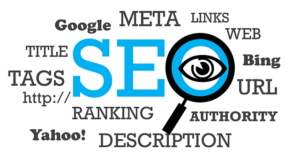Keywords for SEO – how they help your business
All my clients take an interest in the performance of their websites, but most of them don’t want to know the nitty-gritty of how they work. I’ve written a few articles to give you an idea what your web designer and copywriter are talking about, and how they work together to increase your website’s traffic. This time, I’m explaining keywords.
Table of Contents
Using keywords to bring visitors to your site
Keywords – your web designer has told you that you need them, but what are they, and how do you use them? Here’s Word Hen’s quick explanation of how using keywords will bring traffic to your website.
As a business copywriter, I want my site to appear when companies search for help with their communication. I don’t want to turn up for proofreading novel drafts, or writing CVs, or designing leaflets. So, I need to tell the search engines to show my site for business copywriting. That means, giving the web spiders signposts to understand what my site is about. (Web spiders are little programs (also called ‘crawlers’ or ‘bots’) that read a web site to create the result that appears when you search.)
What are your keywords?
 Google used to tell you the words and phrases people typed in before they came across your site. Unfortunately, this little gem isn’t available for the likes of you and me any more. So we have to be clever. There are a number of ways:
Google used to tell you the words and phrases people typed in before they came across your site. Unfortunately, this little gem isn’t available for the likes of you and me any more. So we have to be clever. There are a number of ways:
- Your web designer should set up Google Analytics for you, and through that you can work out what people are likely to be searching for when they land on your site.
- Secondly, what would you type in to find a business like yours? That’s what almost everyone else will be typing too. So that’s a major keyword. However, all your competitors will realise this, so what else might describe your work? Play around with different keywords until you land upon ones that work well for you.
- Linked to this is local search – are you a local business? If so, add keywords that cover your location (and read the part below about off-site SEO.)
- Use social media to find out what your clients are talking about. Search hashtags – where the topic of the post is marked out like this: #copywriting – or just read some of their posts and tweets. Look at their websites. What are their keywords? How can you use them on your own site?
- Keyword phrases – There are 23 million results for copywriter – I’ve just checked. However, if I search SEO business copywriter there are ‘only’ 800 thousand, and I am number five (today, anyway!) So, that’s what I need to use. I can go further into the ‘long tail’ of search results with Freelance SEO web copywriter for businesses in Milton Keynes.
- Synonyms – think creatively. What might people search for as well as your major keywords? Use words that mean the same, or similar. Firstly, search engines are smart enough to recognise that a page about bicycles is also about bikes, tandems, trikes, cycling. Secondly, you may pick up some people who are searching using a synonym.
- Secondary keywords – if everyone is rushing to get the clicks for dentist you might be able to sneak in under the crowd and earn yourself a nice little traffic stream for cosmetic dentist, children’s dentist, teeth whitening, orthodontics, and so on.
- Don’t have too many – every new keyword dilutes the others, so don’t over do it.
Now you have your keywords , how do you use them?
 On your site – in the text
On your site – in the text
It’s important that the text on your site is well written, so you need to include the keywords skilfully. Get them into the headings, and try to use them early on the page. However, don’t over do it. Keep the keyword density below 10%. Ideally around 5% for your main keywords. Anything more and the search engines will suspect you of foul play, and penalise you. This means, if you sell printers, don’t do this:
Printers! Printers! Printers! Our printers are the best printers that you can buy. At Printers R Us, we have been selling printers for more than 20 years. Whether you want a printer for your home, an office printer, or school printer, we can help you select from our wide range of great value printers at our printer showroom in Printertown. Give us a call to talk about your printer needs today!
On your site – in the coding
Your web designer should do this for you. Have your keyword in the <title> tag, and get it near the beginning. This is what shows in the search results as your page’s title, this is what my search result looks like.![]()
Ask your copywriter to craft a good SEO meta description including your keywords. The meta description is what appears below the URL link in the image above. This is usually (not always) what the search engine uses to describe your page. The better written it is, the more likely it will be used, and thus the more control you have over how your site appears in search.
If you can, get your keywords into the website’s URL, but this is less important than having them on the page too. My keywords aren’t in my main URL, the company name is. But I have them in the URL for other pages, and I also own www.business-copywriter.com and other variants.
If you have images on the page (and you should), add the keywords into the <alt> tags. Web spiders can’t look at images, but they do read the tags associated with them. So this is a good way to add more keywords without spoiling the flow of your text.
Meta tags – these are not as important as once they were, but it doesn’t hurt to fill them in properly anyway. Make sure your meta tags include your keywords.
Using your keywords outside your site
This is very important. If another site links to you, that’s good in a search engine’s eyes. Try to control what the anchor text (the text they click on to open your site) says. If it contains one of your keywords, the search engines count that as more important than “click here”. This is why guest blogging and commenting on other sites help your own ratings.
Use your keywords in your social media posts, and include links back to your site as well.
For local businesses, get into online business directories. You can add your keywords in the blurb and link back to your website. For national and international businesses, you can use the same technique with your specialist organisation’s directories.
That’s an overview of what keywords are and why they matter. The next articles will look at the importance of links, how to use social media to boost your traffic, and why your website content needs to be top notch.
About the author: Joanna Brown
 Joanna is a business copywriter, and the driving force behind Word Hen Ltd., a UK company specialising in compelling communication for financial and legal firms.
Joanna is a business copywriter, and the driving force behind Word Hen Ltd., a UK company specialising in compelling communication for financial and legal firms.




Good article! Thank you, Joanna.
Amazing blog. Thanks for the post.
I just couldn’t goo away your web site prior to suggesting that I extremely enjoyed tthe standard info a person provide for your visitors?
Is going to be back steadily iin order to check out new posts